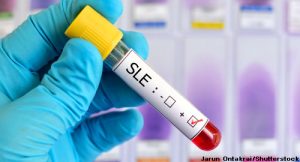 This summer, two phase 3 studies were released with promising findings for the treatment of patients with systemic lupus erythematosus (SLE) and those with lupus nephritis.
This summer, two phase 3 studies were released with promising findings for the treatment of patients with systemic lupus erythematosus (SLE) and those with lupus nephritis.
SLE Disease Activity
Dapirolizumab pegol is a novel, investigational, Fc-free anti-CD40L agent for people living with moderate to severe SLE.1 The randomized, double-blind, parallel-group PHOENYCS GO trial (N=321) evaluated dapirolizumab pegol as an add-on therapy to standard-of-care treatment compared with placebo combined with standard-of-care treatment in patients with SLE. (Note: Standard-of-care treatment at a stable dose included anti-malarial treatment in combination with corticosteroids and/or immunosuppressants, or as stand-alone treatment if justified; or treatment with corticosteroids and/or immunosuppressants if anti-malarial treatment was not possible.)
Dapirolizumab pegol, with standard-of-care treatment, met the study’s primary end point, demonstrating a greater improvement in disease activity scores at week 48 than placebo, as assessed by the British Isles Lupus Assessment Group (BILAG) based Composite Lupus Assessment (BICLA). BICLA is an established, composite, primary efficacy end point for the measurement of clinical disease activity based on patient medical history, clinical examination and laboratory tests. This finding was statistically significant (P value not reported).
In the study, clinical improvements were observed among key secondary end points measuring disease activity and flares. After these positive results, a second phase 3 trial of dapirolizumab pegol is being initiated this year, PHOENYCS FLY (NCT04294667). Additionally, participants from PHOENYCS GO will continue to be followed in a long-term open-label study.2
Kidney Protection
Obinutuzumab (Gazyva) is a type 2 engineered humanized monoclonal antibody designed to attach to CD20 found on certain types of B cells to reduce inflammation by targeting and depleting these disease-causing B cells. Obinutuzumab aims to further protect the kidneys from damage and prevent or delay the development of end-stage renal disease. The agent was originally approved by the U.S. Food & Drug Administration (FDA) on Nov. 1, 2013, to manage patients with previously untreated chronic lymphocytic leukemia in combination with chlorambucil.3 A subsequent FDA approval added the treatment of different stages of follicular lymphoma.4
This July, study results from the phase 3 REGENCY trial, which evaluated patients with active lupus nephritis treated with obinutuzumab (n=271), were reported (NCT04221477).5 This study was double blind and placebo controlled, and participants had proliferative class 3 or 4 lupus nephritis.
Study participants were randomized into two groups. Group 1 received 1,000 mg of intravenous (IV) obinutuzumab at baseline and weeks 2, 24, 26, 50 and 52, along with mycophenolate mofetil (MMF) and oral prednisone. The MMF was administered to a target dose of 2.0–2.5 g/day in divided doses through week 80. The prednisone dose was 0.5 mg/kg/day (maximum 60 mg/day), which started on day 2 of the study. On day 15, the prednisone dose was tapered to 5 mg/day and continued through week 80.
Group 2 received 1,000 mg of IV obinutuzumab at baseline and weeks 2, 24, 26 and 52, plus MMF and oral prednisone. Group 2 participants received a placebo infusion starting at their week 50 visit. All patients were premedicated against infusion reactions with 650–1,000 mg of acetaminophen, 80 mg of IV methylprednisolone and 50 mg of diphenhydramine.
The results: A higher proportion of patients treated with obinutuzumab plus standard therapy achieved a complete renal response at week 76 than patients who received only standard therapy (i.e., group 2). These results were both clinically and statistically significant (P value not reported).6 Key secondary end points were also met, including the proportion of people achieving CRR with a reduced corticosteroid use and a reduced urine protein response. No new safety signals were identified.
Other ongoing investigations with obinutuzumab include use in children and adolescents with lupus nephritis, as well as in individuals with membranous nephropathy, childhood-onset idiopathic nephrotic syndrome and SLE.
Michele B. Kaufman, PharmD, BCGP, is a freelance medical writer based in New York City and a pharmacist at New York Presbyterian Lower Manhattan Hospital.
References
- UCB and Biogen announce positive topline results from phase 3 study of dapirolizumab pegol in systemic lupus erythematosus and are initiating second phase 3 study in 2024 [news release]. Biogen. 2024 Sep 24.
- A study to evaluate the efficacy and safety of dapirolizumab pegol in study participants with moderately to severely active systemic lupus erythematosus (PHOENYCS GO) [NCT04294667]. ClinicalTrials.gov. 5 Jul 2024.
- Biologics license application approval letter for Gazyva (obinutuzumab). U.S. Food & Drug Administration. 2013 Nov 1.
- Highlights of prescribing information: Gazyva (obinutuzumab). U.S. Food & Drug Administration. 2022 Jul 27.
- A study to evaluate the efficacy and safety of obinutuzumab in patients with ISN/RPS 2003 class III or IV lupus nephritis (REGENCY) [NCT04221477]. ClinicalTrials.org. 2024 Jul 17.
- Dennis M. Roche’s Gazyva hoping for second wind after lupus study success. FirstWordPharma.org. 2024 Sep 27.


